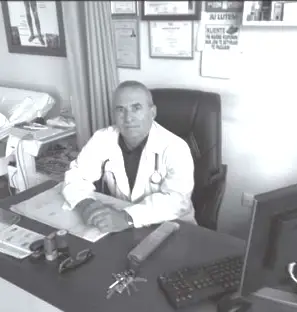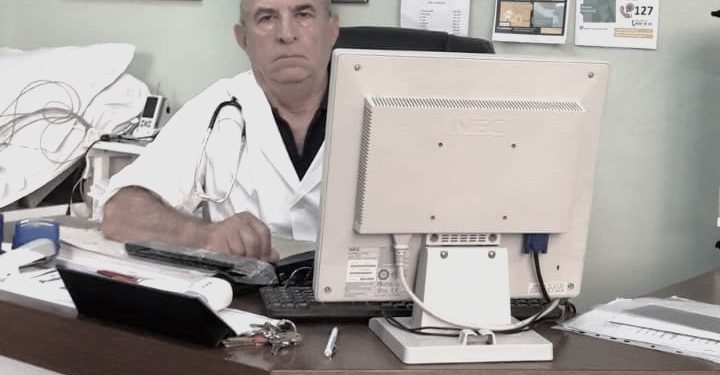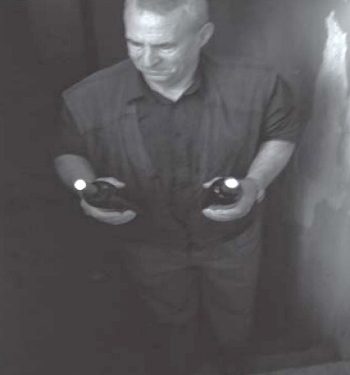By Uvil Zajmi
Memorie.al / To transform a place of refuge from the dictatorship into a winery, you must have an extraordinary imagination. It seems incredible when you see that those shelters still exist, which have been forgotten for several generations. When you remember what they were used for, how they were built, but which were never used, then abandonment, loss without a trace, and oblivion about them…! One of these fortifications has prompted the renowned doctor Pertef Rusi to change its destination after many decades. After taking over the shelter located near the school named after the poet Naim Frashëri, he has transformed the labyrinths of the refuge into an ideal place to store, keep and organize bottles of wine and raki for a long time.
In the production of which his family and relatives are engaged, there at “Vreshtat e Pashaj”, where it is produced in distant Leskovik. But until this shelter-cantina was transformed into a winery, it is a long road. A return in time, to the strategy of population protection in the 1970s, between the construction of shelters and bunkers, alarm sirens and the imaginary invasion by “imperialist and revisionist enemies”, after leaving the Warsaw Pact…!
CONSTRUCTION OF THE CELLAR
The idea of the shelter-cantina is Pertef Rusi, a traumatologist-sports doctor, graduated in 1973 from the Faculty of Medicine. He began working as a pediatrician at Hospital No. 3 in Tirana, where he worked until 1982, (at the same time he also served as a sports doctor for the “17 Nëntori” football team). It was during this period that he separated from pediatrics, by a decision of the Executive Committee of the Tirana District, as someone who was “damaging” this health sector of the capital. Initially, it was a request made by the head of Tirana Pediatrics, Pandora Ketri, who proposed to this council, the transfer of Rus’s file to the Ministry of Education, since he was wanted as a sports doctor, at the “Loro Boriçi” Sports School.
Nesip Ibrahimi, chairman of the Executive Committee in those years, did not accept, canceling the proposal, but with Rus’ insistence on transferring to “Loro Boriçi”, after 6 months Ketri presents the request again, talking about a doctor who has no “results” at work. This time, Ibrahimi gave his approval. Regarding these and other things, Mr. Rusi himself knows us in this exclusive interview that we are publishing in this article.
Doctor Rusi, have you returned to the shelter? Returning and entering a shelter of the dictatorship after many years was a surprise.
I had forgotten them, although for my generation, they are inseparable for many reasons. I remembered running to get in there with the others, waiting for the enemy to arrive, or for the alarm sirens to go off. I even participated in their construction, which was done with volunteer work on Sundays, or at noon, because they had to be finished quickly. I had no idea that after half a century; such a thing would serve me for something else.
What prompted you to use it?
It was the idea of Pandi Sara, former vice president of the unit that includes the 8-year school “Naim Frashëri” in the capital, right next to its wall, where I have my clinic. Sare, also a former athlete (goalkeeper for the “Shëkndia” and “Dinamo” teams) and director of the School of Sports Mastery, where we worked together, recommended that I make the upper part of the shelter a garden with trees, fruits, flowers, roses, and for this he guaranteed me his help. I liked Sare’s proposal and immediately decorated it, while the lower part was the shelter. After we opened it, because it had been closed for a long time and unused, I talked about administering it.
They rented it to me for use for 39 years, with a payment of 42 thousand lek (old) per month. It is 100 m long, but divided into two parts of 50 meters, over 2 meters high and as wide, all in concrete; it was built in 1968, for self-defense. The refuge was not only for the settlement of the population, but there is also an office there, in which the command was supposed to stay, and even a bathroom for the population. In the meantime, I also signed a bilateral contract with the Directorate of Municipal Unit No. 3, which covers gardens, nurseries, greenery, as well as housing, waiting to buy it and privatize it. In the meantime, I still did not have a clear idea of what I would do with it.
How did you come up with the idea of turning it into a liquor store?
After cleaning it, installing the lighting, I had the idea of making its environment functional. After the 90s, we were recognized as owners of several properties in Leskovik, which my maternal grandfather, Sadetin Zavalani, former minister and prefect in Kukës, advisor to Prime Minister Koço Kote, in the Zog government, had left us. Taking advantage of a grant from the Albanian Fund for the Development of Border Mountain Areas, the employment of residents of these areas, vineyards were established where different types of grapes were cultivated. There is also a factory (in the former border military units) that serves and functions in the processing of its varieties. Local residents work there, who take care of the maintenance of the vineyards, the collection of grapes, the organization and production of wine, brandy and distribution.
How do you like a glass of wine in a refuge?
No one understands that down there in the former refuge built for defense, there is a winery. Apart from a wine cellar, they have no other purpose, as they are humid, which damages everything if left for a long time. But, every time I go down, I still have the feeling and it seems to me as if the alarm has been sounded, and I have to hurry, to take a seat in that long concrete corridor. Since I have it attached to the clinic, I take care and never hesitate to go inside.
I want to see and communicate with the wine bottles, the wooden dividers that I have prepared where they are placed and kept. It was an early passion, a connection with wine, especially from my grandfather. And I decided to keep this family passion alive. I have a modest contingent of drinks, in addition to wine, raki and other products. I do not consume it myself, except on occasion, I have it for friends and acquaintances, to whom I give it as a gift, and there is even wine there that is several years old.
What value does a place of refuge of a dictatorship have today?
First, it has a historical value, as a defensive fortification system for the population, during the years of dictatorship. The younger generation expresses surprise, every time they learn why they were built. I applied to buy it and privatize it.
When I took it into use in 2006, the price per square meter of a shelter was only 2 thousand old ALL, while now the figure has increased a hundredfold. I asked and was told that one like that, in the center of Tirana, costs very expensive, up to 200 thousand old ALL per m². Doing the calculations for the 50 m² that I have, I need 10 million ALL to buy and privatize it.
The history of shelters and imaginary invasions by the enemy!
The genesis of a mobilized Albania and the need to defend itself militarily was born after August 18, 1968, when the Soviet Union attacked Czechoslovakia, a country of the Warsaw Pact. After this action, Albania would react through a speech by Prime Minister Mehmet Shehu, on September 13, 1968, at the 6th session of the 6th Legislature of the People’s Assembly, in accordance with the decisions of the 5th Plenum of the Central Committee of the Party of Labor of Albania, to denounce the Warsaw Treaty, and free Albania from any obligation arising from this Treaty.
Thus, Socialist Albania, now separated from the Soviet Union and the Eastern countries, begins a campaign and strategy for the fortification of the country, with the slogan of “Protection of the population”, from an enemy attack, air, ground, atomic bombings, etc., a comprehensive military mobilization, with a comprehensive strategy of the population, without any distinction. In work centers, neighborhoods, schools, universities, everywhere. The basements of the palaces were used, systematizing and cleaning them, but the construction of shelters also began, which were popularly called “refugiums”, as safe places to shelter the population.
HISTORY OF REFUGEES
They were called refugiums from the Italian: a construction that serves as a place of protection from natural hazards, built underground, to protect people from bombings or atomic explosions, poisoning, etc. Built with voluntary labor by residents, they would serve as a place of defense in the event of an invasion or attack by “enemy” forces, from the air and land. Such shelters, up to 100 meters long, 2.5 meters wide and over 2 meters high, were designed in every block, neighborhood near schools, or residential center. Over 100 people were supposed to stay in them; they were entirely made of concrete, underground and had several pipes for ventilation, as well as lighting. They were maintained and their keys were held by authorized and trusted people.
MIDNIGHT ALARMS, A TEST FOR THE POPULATION
Along with the construction of shelters, systematic tests began to see readiness, as well as the time and speed with which, in the event of an alarm, the population had to take shelter within 15 minutes. In buildings, high points of the city, in enterprises, alarm devices (bells, sirens, etc.) were placed which, with a command from the center, and especially at night, began to howl, which meant that the alarm had been given for an imaginary invasion.
The residents ran quickly to get into the refuge. After a silence, for an indefinite time, the sirens were again announced that the population should leave and return to their homes. Such a system, shocking in both physical and psychological aspects, has operated for a long time. To come then to the famous bunkers, the construction of which began a few years later. These were also part of the defense strategy against an enemy that never appeared…?!
EVACUATION TO THE VILLAGES, CARS WITH LIST
Another plan in case of alarm was the evacuation of the population in the outskirts of Tirana, towards the villages of Farkë, Babrru, Zall-Herr, Mullet, etc., since in addition to the systematization and orientation for a quick shelter in the refuge, the government also had a second plan: the departure of the population to the countryside. Each family from the capital, according to a plan, was connected to a family in the countryside, where it would stay in the event of a long invasion.
Lists were drawn up, acquaintances of families who exchanged visits with each other, a large and detailed organization. The journey there was organized as a march and the families were forced to set off on foot from Tirana, since there were no means. Even the license plates of the cars, although not very popular, those of enterprises, directors, institutions, were filed with the destination and the function they would perform in the event of war.
STUDENTS, GUARDS AT THE ARMS DEPOSIT
For the students of various faculties in Tirana, there was a different strategy. In case of alarm, they would run to be near their faculty, to take control of the weapons depot. Since they were considered non-commissioned officers, they were also entrusted with such an important task. Squads, volunteer forces, infantry were created, and the population was instructed how to use masks against fire, poisonous substances, etc. Anti-aircraft machine guns were placed on the terraces of the buildings, as well as the people who would use them. The theories of defensive warfare, the conditions in which Albania is located, the positive factors of a mountainous terrain, not favorable for the enemy, began in schools, while the flights received a different treatment and everything was lived, worked with eyes and ears to an enemy attack.
THE SURPRISE OF FOREIGNERS
We are in the years 1968 and onwards, when the alarm system and the fear of an enemy aggression had invaded every family, big and small. But, what was extremely curious has to do with the foreigners who came to Albania in those years. During this period, the Torino football team, which came to Tirana in September 1968, to play against “Partizan” in the Cup Winners’ Cup, was shot.
While they were at the “Dajti” Hotel, the day before the meeting, the alarm is heard and the entire city is covered in darkness. Without understanding anything and worried, athletes and leaders go down the stairs and go out into the street, in the square in front of “Dajti”, completely empty.
After the alarm has ended, they are informed about what they have experienced. Meanwhile, the political situation has a different course, as these are the years of the beginning of Albanian-Chinese friendship, when Mao Zedong also supported the denunciation of the Warsaw Pact, giving a guarantee to the Albanians that they would be protected and supported in the economic, military, cultural aspects, in sports, art, infrastructure, construction, everywhere.
It was propagated as an unbreakable friendship for centuries, but it would not be so until the end, as Enver Hoxha, after China’s rapprochement with the US in the early 1970s, slowly began to cool down with the “sister party” of the distant Asian country, which led to Beijing withdrawing all its specialists, military and civilian, from Albania in 1978. Memorie.al















